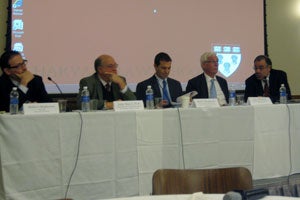On Nov. 9 the Harvard Law & International Development Society, an HLS student group, held its annual symposium, this year highlighting the increasingly global nature of anti-corruption efforts. The day-long event, “Development amidst Corruption | Developments against Corruption,” began with vivid personal narratives from the trenches: speakers included undercover agent Robert Mazur, Ombudsman of the Philippines Conchita Carpio-Morales, and El Cid Butyayan, senior litigator for the World Bank.
The symposium also highlighted a series of ideas for tackling corruption. During an afternoon panel, Mark L. Wolf ’71, chief judge of the U.S. District Court for the District of Massachusetts, proposed the establishment of an international corruption court, analogous to the International Criminal Court in The Hague.
Wolf has presided over several large, high-profile corruption cases, including a massive effort focused on the FBI and its top Mafia informants and the recent trial of the speaker of the Massachusetts House of Representatives.
Wolf speaks around the world on fighting corruption. He noted that in many countries, the factors that led to the successes in cases he was involved in are not in play: often members of government enjoy legislative immunity, there is no independent media, no impartial judiciary and no jury trials. Wolf said he’s met impressive people trying to make a difference in these systems. But it’s not reasonable to expect the high officials who are benefitting from corruption to allow the development of a system for effectively prosecuting corruption.

Conchita Carpio Morales, ombudsman of the Philippines
“These conditions are comparable to those that led to the creation of the International Criminal Court,” Wolf said. “That’s why I propose we should have something comparable, to end the culture of corruption and deter corruption by the highest officials.”
The court he is proposing would function on the principle of complementarity, like the ICC, and only exercise its jurisdiction when the state party of which the accused is a national is unable or unwilling to prosecute. “The positive international law exists.” he said. “An international corruption court would only be a new enforcement mechanism.”
James Hamilton, former director of public prosecutions in Ireland and president of the International Association of Prosecutors, focused his remarks on corruption in the political process and on the scope for corruption that private funding of political campaigns creates.
“We are familiar with the idea of direct bribery, or quid pro quo corruption,” he said. But much of the time, the actual corruption is not so straightforward. Instead there will be a donation to a political party that secures access, which the ordinary citizen doesn’t have. “In my view,” he added, “it’s a form of corruption because it undermines democracy and the principle of the equality of citizens.”
U.S. law is contributing to the problem, he added, calling the Citizens United decision, “a setback internationally for efforts to regulate corruption.”
HLS Professor Matthew Stephenson ’02, the one academic speaking at the conference, contributed what he called the “view from 30,000 feet,” looking at some surprising findings with regards to corruption and its relationship to other aspects of politics and culture, economics and society.
Among his observations was the fact that high levels of democracy and liberalization and economic growth generally are associated with low levels of corruption, yet the processes of democratization, economic liberalization and rapid industrialization are all associated with increases in corruption. This paradoxical connection suggests that “managing transitional moments poses its own challenges.”
Another panelist, Mark Mendelsohn, the former head of the U.S. Justice Department’s Foreign Corrupt Practices Act Enforcement Unit, said that during his tenure, the DOJ brought more than 50 prosecutions against corporations for FCPA and related offenses, resulting in more than $1.5 billion in criminal penalties against companies including Siemens and Daimler. Yet he called these efforts “a drop in the bucket.”
Mendelsohn, who is credited as the architect and key enforcement official of DOJ’s modern FCPA enforcement program, is now a partner at the law firm Paul, Weiss, Rifkind, Wharton and Garrison, where he represents corporate clients in FCPA matters including compliance.
The real multiplier effect, he said, will come from the private sector joining with government to deal with the corruption problem.
“For those of you thinking about this from a development point of view,” he told the audience, “be sure that you are thinking about the role of the private sector as you think about solutions because without them you are never going to get where you need to be.”
